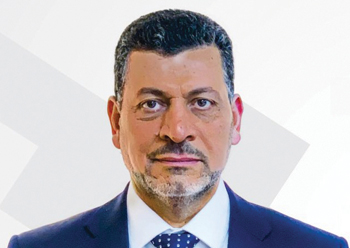
 Najjar ... there’s a serious talent shortage.
Najjar ... there’s a serious talent shortage.
There is a strong demand in the Middle East for project management professionals in the construction and infrastructure industries, driven by large-scale projects, according to the Project Management Institute (PMI).
Furthermore, project managers with expertise and experience in embedding the environmental, social and governance (ESG) framework and sustainablity practices into every function, process and decision across the value chain are in high demand in the region, the institute’s Regional Managing Director for Mena region, Grace Najjar, tells Gulf Construction.
“Project professionals, especially those with the power skills such as problem solving and relationship building, digital transformation and innovation in project management practices, will be needed each year to lead and manage these initiatives in the region, and deliver strategic value,” she points out.
The PMI has recently produced a report entitled Global Project Management Job Trends 2023 which highlights that the demand for project management professionals is expected to continue to grow globally, with the Middle East being no exception. The construction and infrastructure industries are predicted to drive the strong demand for project management professionals in the region.
 |
|
Communication, problem-solving, collaborative leadership and strategic thinking are key power skills. |
Excerpts of the interview:
What are the findings of the Global Project Management Job Trends 2023 report and comment on these with specific reference to the Middle East.
According to the Global Project Management Job Trends 2023 report (https://www.pmi.org/globaljobtrends), the demand for project management professionals is expected to continue to grow globally, despite disruption and uncertainty. Even as many companies buckle up to respond to the economic downturn, there’s still a serious talent shortage. In the Middle East specifically, the report predicts a strong demand for project management professionals in the construction and infrastructure industries, driven by large-scale projects.
Fuelled by oil revenues – which are expected to rebound to pre-pandemic levels – many countries across the Middle East and North Africa (Mena) region expect to maintain solid growth and will continue to reinvest energy revenues into massive infrastructure projects while simultaneously working toward constructing a more sustainable future.
The Economist Intelligence Unit forecasts that the GCC’s construction sector will grow by as much as four per cent. About 80 per cent of the estimated $2.65 trillion worth of construction and infrastructure projects in the region are in Saudi Arabia and the UAE.
The Saudi government will continue its massive investments in infrastructure, tourism and transportation megaprojects. A case in point is the $500-billion futuristic city Neom, but the kingdom’s Vision 2030 transformation plan involves much more than megacities rising from the desert, which could parlay into jobs for project professionals across sectors. It is worth noting that job opportunities for women continue to increase, almost doubling over the past five years to reach 33 per cent in 2022, which hits the Vision 2030 target of more than 30 per cent of women in the workforce.
Qatar’s influence is also growing in the region as it expands natural gas exports across Europe and China, among other places. Such activity will help the country sustain the megaproject momentum that came with its hosting of the 2022 Fifa World Cup, which included investments in a new public rail system, highways and hotels. Now Qatar hopes to pivot deeper into education and renewable energy initiatives.
Project professionals, especially those with the power skills such as problem solving and relationship building, digital transformation and innovation in project management practices, will be needed each year to lead and manage these initiatives in the region, and deliver strategic value.
Apart from direct hiring, what are the options available for companies in the region to source experienced project management staff?
In addition to direct hiring, companies in the Middle East can source experienced project management staff through outsourcing, contract staffing, and project-based engagements. These options allow companies to access specialised skills and expertise on a project-by-project basis, which can be more cost-effective and flexible than direct hiring.
With staff retention being a high priority in the Middle East, what can companies in the region offer to ensure job satisfaction? What are some key factors that drive staff retention?
Staff retention is a high priority in the Middle East, and companies can ensure job satisfaction by offering competitive compensation packages, opportunities for learning and development, a positive work environment, good work-life balance and a sense of meaning from work. Key factors that drive staff retention in the Gulf region include job security, career advancement opportunities, and a positive company culture.
With the increasing popularity of remote working and the difficulty of sourcing staff willing to relocate to the region, is there an increasing tendency among companies to employ staff overseas?
Due to the difficulty of sourcing staff willing to relocate to the Middle East, companies and governments are working to attract talent from across borders. The construction and technology-related industries are creating strong incentives for relocation in the Gulf region.
Having said that, leading governments in the region have shown great commitment toward building the capabilities of their professional communities and empowering their local talents to get more nationals into the needed roles. This is evidenced by the nationalisation agenda and initiatives taken across the region.
With reference to the region, provide details of the most important power skills a project manager must possess to gain a career advantage.
Across nearly all sectors, communication is the most important power skill to possess, according to project professionals surveyed in the PMI Pulse of the Profession 2023 report. Overall, 68 per cent of respondents said it was the most critical power skill – followed by problem-solving (65 per cent), collaborative leadership (62 per cent) and strategic thinking (58 per cent). Mastering such behaviours, along with core technical skills, will make project professionals more valuable – and could make them less vulnerable in cases where the job market declines.
Other important skills include adaptability, flexibility, and risk management that are very relevant to the Gulf region.
In the leading countries, English is broadly and very well spoken. We need to conduct a deeper study into the language barriers for the remaining countries in the Mena region.
With sustainability now becoming a high priority in both real estate developments and renewable energy projects, please comment on the importance of project managers offering this expertise and experience when looking at working in the Gulf region.
Across the Mena region, sustainability has become a top priority for businesses and organisations including real estate developments and renewable energy projects. This is evidenced by the establishment of wide-ranging national and regional initiatives geared towards the protection and preservation of the environment and the launch of ambitious human-centered projects designed to safeguard the health and wellbeing of communities, our natural surroundings and prosperity.
Project managers with expertise and experience in embedding the ESG framework and sustainability practices into every function, process and decision across the value chain are, therefore, in high demand in the region.
By incorporating sustainability into their project management practices, project managers can help organisations in the region meet their environmental and social responsibility strategies, goals and visions, while driving long-term value and success.
There are opportunities for organisations to equip project managers with the tools and expertise needed, by incentivising learning, such as leaning into resources – like PMI’s partnership with Green Project Management – or investing in certifications for employees.
What courses and training does the Project Management Institute offer to people in the region or individuals looking at working in the region?
PMI is contributing to the skill development and capability building for individuals by offering a career framework from entry level up to the transformation leadership level, in a world which is really aspiring for less inefficiencies.
It also partners with organisations, and governments that are demonstrating a strong commitment to elevating project management capabilities in the region.
PMI offerings include globally recognised standards, certifications, online courses, thought leadership, tools, digital publications, and communities. Its Project Management Professional (PMP) certification, is highly sought after in the region, as it allows individuals to work smarter, in an agile and effective way and spearhead tangible change and reduce the amount of time and resources wasted. Its updated PMP with the new standards is providing the skillset and mindset for project managers.
Its Construction Professional in Built Environment Projects (PMI-CP) certification tackles the pain points faced by construction organisations and ensures they have certified project managers and skilled project professionals, fully equipped with the crucial project management skills, business acumen, familiarity with new ways of working, and necessary knowledge of emerging technology required for the efficient use of investment and delivering projects on time and within budget.
Project Management Institute also offers online courses and virtual training options, making it easier for individuals to access training and education from anywhere in the world.
Anything else you would like to add about Project Management Institute and the jobs market in the Middle East.
The Project Management Institute is a global leader in project management education, training, and certification. As the demand for project management professionals continues to grow in the Middle East, organisations in the region can benefit from partnering with Project Management Institute to access the latest best practices and training.






.jpg)









.jpg)




































.jpg)


